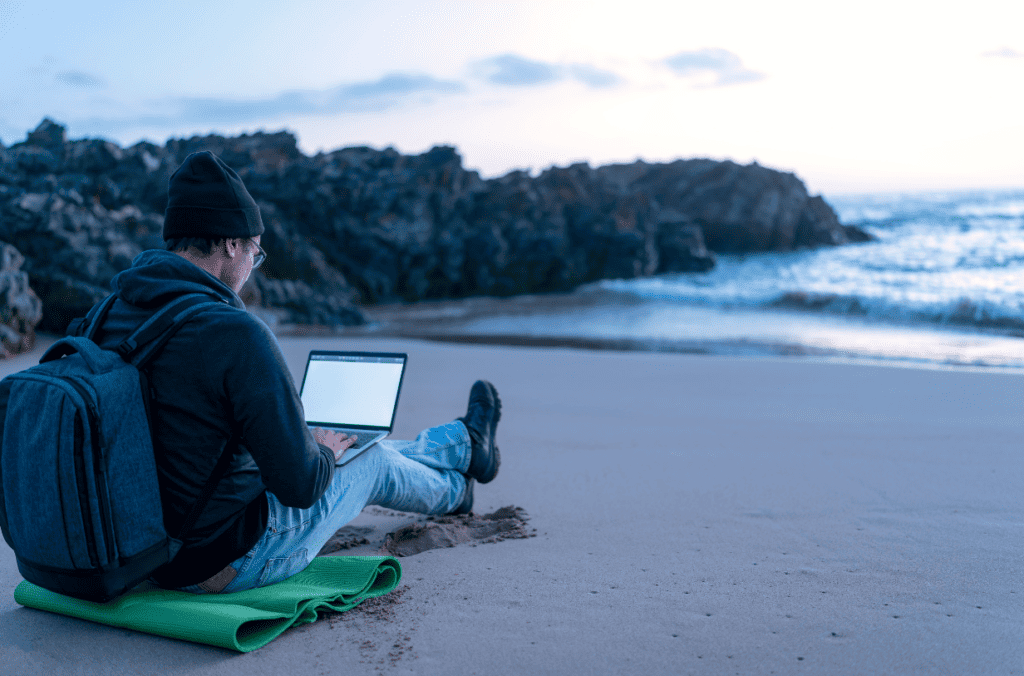Digital nomads are an increasingly influential force in the workplace. If you’re a digital nomad, you are part of a burgeoning group of employees who are connected to work via the internet but untethered to a location.
Table of Contents
Digital nomads are workers who choose to take on remote work assignments while traveling domestically, abroad or both. Many digital nomads want to explore the world and have the flexibility to work from anywhere, as long as there’s an internet connection to keep them connected to work.

According to one report, there are 17.3 million Americans who identify as digital nomads, growing at a stunning 131 percent rate from 2019 to 2022. In 2023, the number of digital nomads who held traditional jobs declined by 4 percent, to 10.7 million, while the number of independent workers grew by 14 percent to 6.6 million.
That means there are millions of workers who are working one or more independent gigs, as numbers climb in a post-pandemic world that changed dramatically due to the change in working styles and adaptability of employers.
What does that mean for those nomadic employees? Consider that the digital nomad lifestyle comes with some flexibility but not all the protections that a full-time, permanent gig provides.

As a digital nomad, it’s important to consider some legal moves to ensure that you are protected and your business structured properly. To help get started here are some legal tips to organize your business as a digital nomad.
1. Choose the Right Business Structure
A business structure is the formal organization of your business and is important for tax and liability matters. While there are multiple structures to consider, most digital nomads choose either a sole proprietorship or limited liability company (LLC).
Sole Proprietorship
This structure is the simplest and most basic because it requires no paperwork or formal applications. In a sole proprietorship, there is one owner who is financially responsible for the business.
From a tax perspective, it’s simple. The profits and losses for the company are filed on the owner’s federal and state tax returns. Owners can take advantage of business deductions to reduce their tax burden but will pay the employer portion of Social Security taxes and other federal and state business taxes.
From a liability perspective, there is some risk to starting a sole proprietorship. If there are debt obligations or legal judgements against the business, the owner is fully responsible for paying. An owner’s personal assets can be tapped to cover the financial commitments. In addition, a sole proprietor may find it difficult to secure financing.
Limited Liability Company
An LLC is one of the most popular business types.
Owners (called members) are shielded from personal liability for debt (except in cases where there is negligence or wrongful conduct) that leads to injury).
Profits and losses pass through to owners’ individual returns, much like in a sole proprietorship. LLCs can opt whether to be taxed as a partnership or a corporation and owners do not need to pay unemployment insurance tax on their own salaries. In addition, any operating losses can be deducted against owners’ income.
Setting up an LLC is simple, with minimal paperwork required. While other corporations need to hold formal board meetings with minutes and annual reports, those requirements are not applicable with an LLC.
Selecting the State for Your LLC
With an LLC, you can choose the state in which to register your LLC. However, each state has its own regulations and conditions that govern LLC filings.
Digital nomads should consider the guidelines for each state and understand the rules that govern LLCs. Some states, for example, require residency. For others, such as if you register your LLC in Texas, you do not need to be a resident or have a physical office in the state, which can be ideal for digital nomads.
2. Know Laws about Working Abroad
If you choose to work abroad, you will be subject to various laws affecting your ability to work and taxes on any income. The laws vary by country, so it will be Important to understand any restrictions or guidelines you must follow while living and working abroad.
In most cases, when you have a valid visa, you can stay in another country for up to six months (183 days). If traveling for less than 90 days, a tourist visa typically suffices.
While these visas typically prohibit work within the country, the rules around whether you can work online for a company in your home country are somewhat gray.
If your work is exclusively online for your home country, most foreign officials will turn a blind eye. However, if your work involves sales or contracts within the country you are visiting, you will likely need a work permit.
If your company has offices within the country, it can often apply for a work visa on your behalf. Due to the growth of remote work, more than 50 countries now offer digital nomad visas that have tax exemptions and other provisions that make it easier to work abroad.
3. Be Clear about Tax Rules
Tax rules can often be complex for digital nomads, with considerations both federally and internationally. When working abroad, for example, you are taxed on local income but not foreign income earned.
However, that rule applies when living abroad for less than six months. After that, you are considered a resident from a tax perspective. That could mean you're taxed in both your native country and ones where you are living.
Many countries have rules that ensure your income is only taxed in one country but some countries, including Argentina, Brazil and Singapore, have no such agreements with the United States.
In all cases, it’s best to consult with a tax accountant before adopting a digital nomad lifestyle.
4. Sign Contracts for Your Work
Any freelancer seeking to work as a digital nomad should create contracts with employers. A binding contract helps ensure that deliverables, payments, expectations, reimbursements, intellectual property rights and other details are spelled out explicitly for both parties.
Contracts are important whether working for clients domestically or internationally. Especially when working abroad, it’s important to have a clear sense as to the applicable laws and regulations governing compensation and freelance work.
Contracts should also include guidelines for dispute resolution, whether via mediation, arbitration or the courts. This step can avoid complications should conflicts occur.
5. Get Trademarks
Freelancers need to protect their intellectual property. It protects your creative work from being stolen and used by someone else. Copyrights are formal registrations of creative works with the U.S. Copyright Office.
Once a copyright is granted, the author has the sole right to use the materials, modify them or publish them. Copyrights can apply to written materials, music, choreography and graphics, among other work.
Trademarking is another effective way to protect intellectual property. Trademarking is applied to names, symbols or phrases used in commerce and used to promote a product or service.
You can apply for trademark protection at the federal and state level. Federal trademark protection applies to the whole country while state protection is only effective in the state.

Final Words for Digital Nomads
Being a digital nomad is an exciting way to live and work today, allowing for flexibility while working from different locales and doing work for one company or multiple clients.
Knowing the important legal steps to take with your business ensures you are protected and able to work wherever you choose to live. From selecting the right business structure to protecting your rights with contracts and trademarks, digital nomads can be confident they’ve been smart about their approach to work.
Digital Nomads FAQs
1. Are there different types of digital nomads?
There is not one type of digital nomads. Some are remote workers who work for one company or client. Others are freelancers who work for multiple clients on a project-by-project basis. Some are entrepreneurs who have their own startup and work with remote employees.
2. Where do digital nomads work?
Some digital nomads work from their homes, apartments or hotel rooms while traveling, or at coffee shops or cafes that have free Wi-Fi. Others use co-working spaces, which come with small offices or cubicles with strong Wi-Fi, work desks and chairs, and shared amenities.
3. How do you start as a digital nomad?
Consider the skills you can offer to clients, whether it’s writing, design, accounting or project management. Before making the leap from full-time employment, you may want to take on a few clients to see if the lifestyle works for you and is financially viable.
4. How many hours do digital nomads work?
One of the benefits of being a digital nomad is being able to set your own hours. Some choose to work a traditional 9-to-5 workday. Others work flexible hours, which is one of the greatest benefits of the lifestyle. For those who can afford it, digital nomadism allows for fewer hours “in the office” with the income to support themselves.



